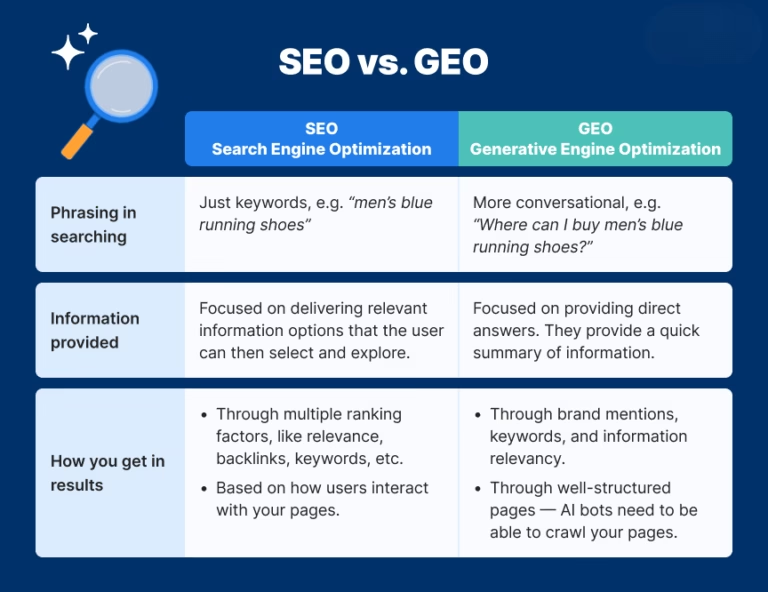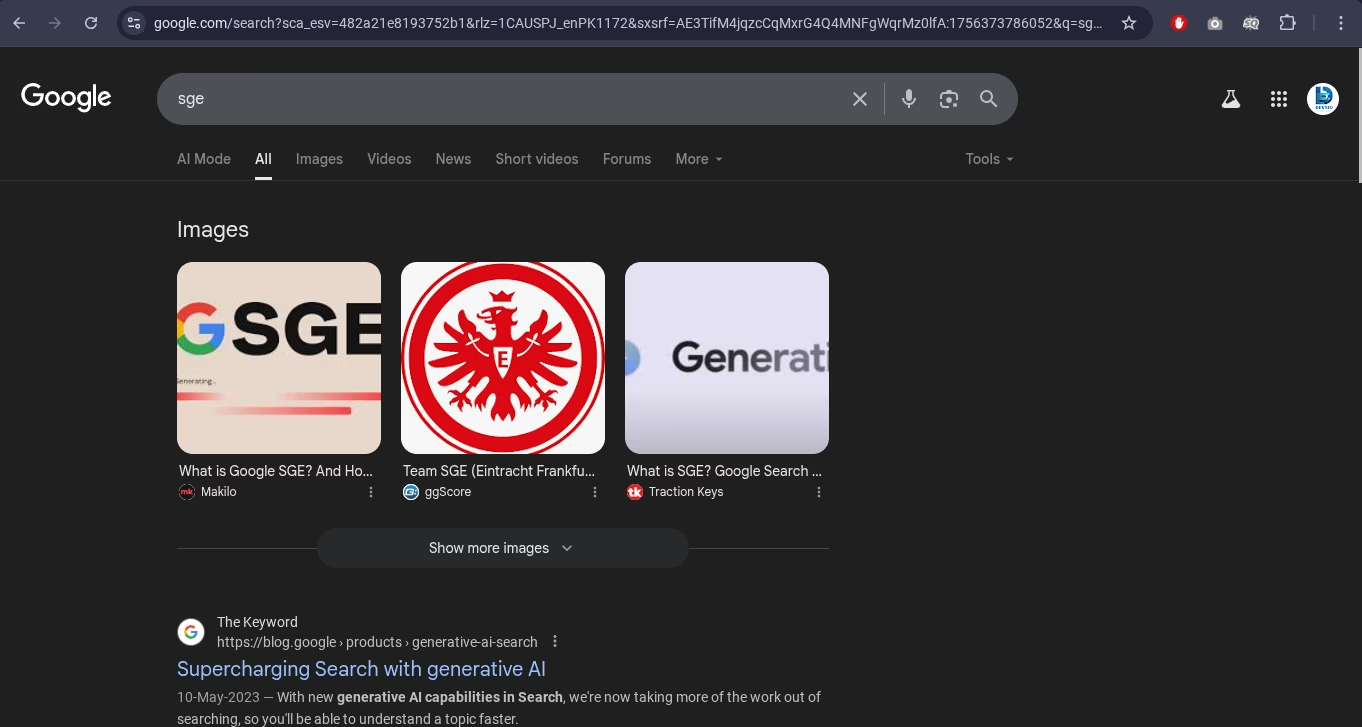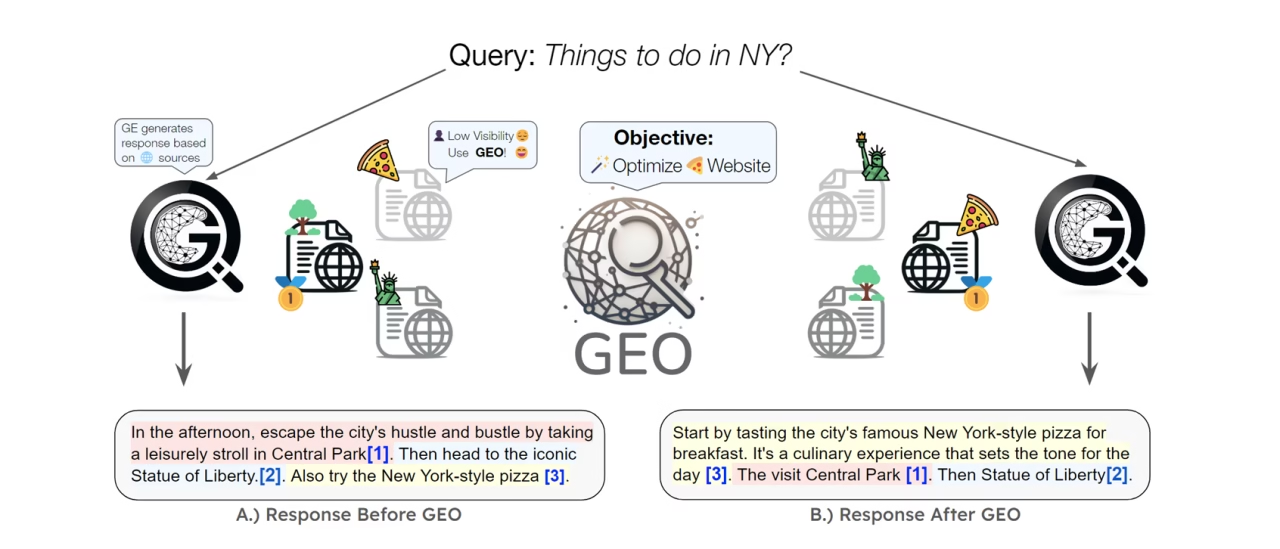What is Generative Engine Optimization?
Generative Engine Optimization (GEO) is a superior understanding of traditional SEO. Unlike traditional SEO which is primarily about optimization for search engines like Google‘s traditional SERPs, GEO is about optimizing your content for artificial intelligence-driven answer engines—Google’s SGE (Search Generative Experience), ChatGPT, Bing AI, and Gemini. These systems not only link to your content, but they summarize it, interpret it, and quote it. GEO is all about structuring content for AI models to easily interpret, take from, and add to their responses.
- Internal Link : Learn more how we at Devsio help business rank with SEO strategies
The Significance of GEO in 2025
In 2025, more than 50% of users will be interacting with AI-generated search results. GEO is now necessary–––it is no longer a nice–to–have.
Generative engines prioritize:
- Concise and clear information
- Structured data with headings, lists, and schema
- Authoritativeness and depth on a topical area
- Freshness and updated data
GEO differs from SEO in that SEO was focused on getting a site or webpage ranking first, while the aim of GEO is to either be cited or directly included in an AI‘s answer block.
- External Link: Review Google’s Search Generative Experience (SGE).
Essential Tactics for Generative Engine Optimization
You can become an expert at generative engine optimization by following these best practices:
- Employ Structured Content : Utilize proper H1–H3 tags, bullet points, FAQs, and schema markup. This way, the AI engines will more easily comprehend the structure and purpose of your content.
- Write As If You’re Answering Questions : AI models prefer suitable, helpful human-like answers. Use conversational language and keep the user’s intent behind the search query in mind.
- Add Author Expertise and Sources : Add author bios and credentials, and external sources where applicable. This builds trust with generative engines.
- External Link: Read about E–E–A–T (Experience, Expertise, Authority, Trustworthiness)
- Continue Updating Your Content : AI models are more likely to cite new or recently updated content. Use timestamps, and keep evergreen posts updated on a regular basis.
GEO vs Traditional SEO

SEO to SGE: From ranking to understanding users
The transition from SEO to SGE is not merely an abstraction of algorithms; it is a smarter search. SEO was built around getting webpages at search result page elevation, often leveraging keywords to accomplish that. SGE uses AI and focuses on understanding user intent. Rather than just listing links, SGE‘s
SGE
SGE refers to search generative experience. SGE uses AI to understand user intent and create summaries of information from many different sources.

GEO
Generative Engine Optimization (GEO) is a new concept compared to the well-established Search Engine Optimization (SEO) we all know.

Resources and Platforms you can Utilize for GEO
Here are some important resources to help optimize for generative engine optimization:
- ChatGPT & Gemini: Try prompting AI tools with your target questions to see your content‘s availability.
- Google Search Console: See how using Google’s SGE pulls at your snippets.
- Frase / Surfer SEO: These tools allow you to optimize for content based on the intents of a query.
- Schema.org: Adding structured data can help AI come to a better conclusion about your content.
Would you like your content to be shown in AI search results?
Reach out to Devsio‘s SEO experts and see if there‘s a tricky aspect to GEO optimization.
Conclusion
As AI creates a new way for people to search, generative engine optimization will soon become the latest avenue for visibility. Businesses that understand how to optimization for GEO will begin becoming part of future conversations, and not just search results.
At Devsio, we work with brands looking to future–proof their brand from digital trends. Whether you are refreshing old blogs or simply wanting to create new content, we will optimize for both humans and machines.
